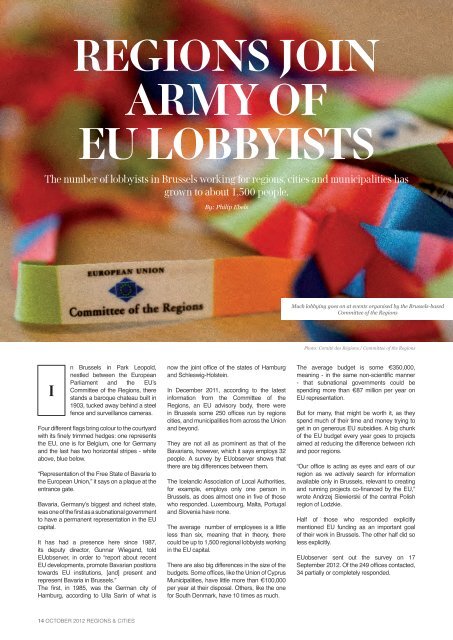Regions & Cities 2012: Economic Crisis & Austerity
The 2012 edition of EUobserver's Regions & Cities magazine looks at the impact of the economic crisis on Europe.
The 2012 edition of EUobserver's Regions & Cities magazine looks at the impact of the economic crisis on Europe.
Create successful ePaper yourself
Turn your PDF publications into a flip-book with our unique Google optimized e-Paper software.
REGIONS jOIN<br />
army OF<br />
EU lobbyISts<br />
The number of lobbyists in Brussels working for regions, cities and municipalities has<br />
grown to about 1,500 people.<br />
By: Philip Ebels<br />
Much lobbying goes on at events organised by the Brussels-based<br />
Committee of the <strong>Regions</strong><br />
Photo: Comité des Régions / Committee of the <strong>Regions</strong><br />
I<br />
n Brussels in Park Leopold,<br />
nestled between the European<br />
Parliament and the EU’s<br />
Committee of the <strong>Regions</strong>, there<br />
stands a baroque chateau built in<br />
1903, tucked away behind a steel<br />
fence and surveillance cameras.<br />
Four different flags bring colour to the courtyard<br />
with its finely trimmed hedges: one represents<br />
the EU, one is for Belgium, one for Germany<br />
and the last has two horizontal stripes - white<br />
above, blue below.<br />
“Representation of the Free State of Bavaria to<br />
the European Union,” it says on a plaque at the<br />
entrance gate.<br />
Bavaria, Germany’s biggest and richest state,<br />
was one of the first as a subnational government<br />
to have a permanent representation in the EU<br />
capital.<br />
It has had a presence here since 1987,<br />
its deputy director, Gunnar Wiegand, told<br />
EUobserver, in order to “report about recent<br />
EU developments, promote Bavarian positions<br />
towards EU institutions, [and] present and<br />
represent Bavaria in Brussels.”<br />
The first, in 1985, was the German city of<br />
Hamburg, according to Ulla Sarin of what is<br />
now the joint office of the states of Hamburg<br />
and Schleswig-Holstein.<br />
In December 2011, according to the latest<br />
information from the Committee of the<br />
<strong>Regions</strong>, an EU advisory body, there were<br />
in Brussels some 250 offices run by regions<br />
cities, and municipalities from across the Union<br />
and beyond.<br />
They are not all as prominent as that of the<br />
Bavarians, however, which it says employs 32<br />
people. A survey by EUobserver shows that<br />
there are big differences between them.<br />
The Icelandic Association of Local Authorities,<br />
for example, employs only one person in<br />
Brussels, as does almost one in five of those<br />
who responded. Luxembourg, Malta, Portugal<br />
and Slovenia have none.<br />
The average number of employees is a little<br />
less than six, meaning that in theory, there<br />
could be up to 1,500 regional lobbyists working<br />
in the EU capital.<br />
There are also big differences in the size of the<br />
budgets. Some offices, like the Union of Cyprus<br />
Municipalities, have little more than €100,000<br />
per year at their disposal. Others, like the one<br />
for South Denmark, have 10 times as much.<br />
The average budget is some €350,000,<br />
meaning - in the same non-scientific manner<br />
- that subnational governments could be<br />
spending more than €87 million per year on<br />
EU representation.<br />
But for many, that might be worth it, as they<br />
spend much of their time and money trying to<br />
get in on generous EU subsidies. A big chunk<br />
of the EU budget every year goes to projects<br />
aimed at reducing the difference between rich<br />
and poor regions.<br />
“Our office is acting as eyes and ears of our<br />
region as we actively search for information<br />
available only in Brussels, relevant to creating<br />
and running projects co-financed by the EU,”<br />
wrote Andrzej Siewierski of the central Polish<br />
region of Lodzkie.<br />
Half of those who responded explicitly<br />
mentioned EU funding as an important goal<br />
of their work in Brussels. The other half did so<br />
less explicitly.<br />
EUobserver sent out the survey on 17<br />
September <strong>2012</strong>. Of the 249 offices contacted,<br />
34 partially or completely responded.<br />
14 OCTOBER <strong>2012</strong> REGIONS & CITIES

















